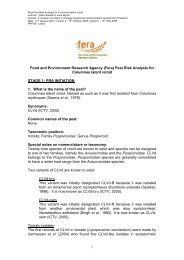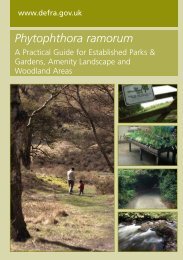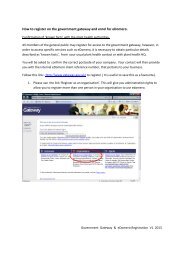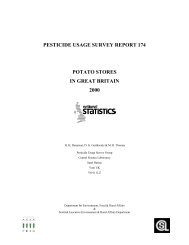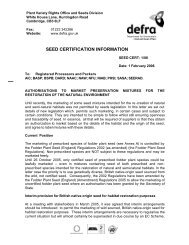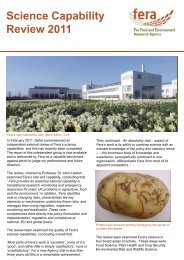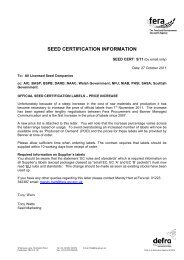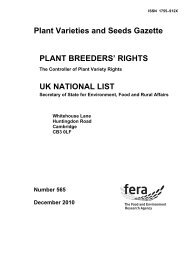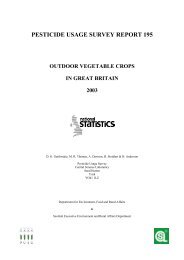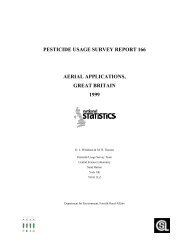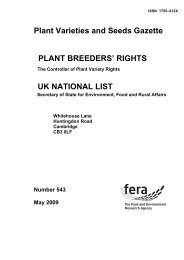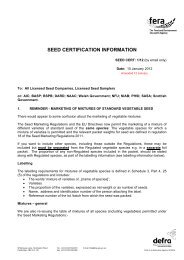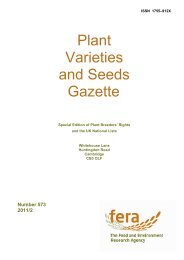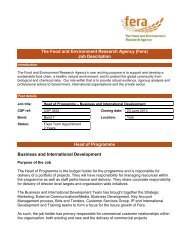National Bee Unit - The Food and Environment Research Agency ...
National Bee Unit - The Food and Environment Research Agency ...
National Bee Unit - The Food and Environment Research Agency ...
Create successful ePaper yourself
Turn your PDF publications into a flip-book with our unique Google optimized e-Paper software.
<strong>National</strong> <strong>Bee</strong> <strong>Unit</strong><br />
Protecting the honey bee
Protecting the<br />
honey bee<br />
OUR ROLE<br />
We protect the honeybee; an essential pollinator of<br />
crops <strong>and</strong> wild plants, <strong>and</strong> support the beekeeping<br />
industry through:<br />
• Controlling serious endemic pests <strong>and</strong><br />
diseases to minimise the economic<br />
<strong>and</strong> environmental impact as much as<br />
possible.<br />
• Advising beekeepers on the recognition<br />
<strong>and</strong> control of pests <strong>and</strong> diseases to<br />
make the industry more self-sufficient.<br />
• Minimising the risk of importation of<br />
exotic pests <strong>and</strong> diseases <strong>and</strong> managing<br />
the risks should serious exotic organisms<br />
be discovered.<br />
<strong>The</strong> <strong>National</strong> <strong>Bee</strong> <strong>Unit</strong> (NBU) does this using an<br />
integrated programme of apiary inspections, disease<br />
diagnosis, research, training <strong>and</strong> extension, provided<br />
by a team of scientists <strong>and</strong> experienced practical<br />
beekeepers.<br />
We also provide specialist advice <strong>and</strong> technical<br />
consultancy services on bee health to Government<br />
departments, beekeepers <strong>and</strong> industry.<br />
2 PROTECTING THE HONEY BEE<br />
OUR STAFF<br />
Our highly specialised team includes<br />
skilled technical staff that are either<br />
apiculture specialists or scientists<br />
trained in beekeeping. Some have<br />
experience working abroad, including<br />
managing beekeeping businesses<br />
<strong>and</strong> providing consultancy services to<br />
overseas governments. Such work leads<br />
to extensive national <strong>and</strong> international<br />
contacts in apiculture, insect pathology<br />
<strong>and</strong> environmental science, <strong>and</strong><br />
membership of international groups<br />
working in related areas.<br />
<strong>The</strong> NBU runs about 150 professionally<br />
managed honeybee colonies to support<br />
training <strong>and</strong> both statutory <strong>and</strong><br />
commercial work.
<strong>Bee</strong> health<br />
inspection<br />
NBU Regional <strong>Bee</strong> Inspectors<br />
organise bee health inspections<br />
using a staff of highly skilled<br />
beekeepers as Seasonal <strong>Bee</strong><br />
Inspectors, under the guidance<br />
of the <strong>National</strong> <strong>Bee</strong> Inspector.<br />
<strong>The</strong> <strong>Bee</strong> Health Inspectorate not only looks for <strong>and</strong><br />
treats notifiable diseases, but also trains beekeepers,<br />
assists with field trials <strong>and</strong> research, <strong>and</strong> provides<br />
first h<strong>and</strong> up-to-date information on industry issues.<br />
<strong>The</strong> team completes a targeted statutory disease<br />
inspection programme for Defra <strong>and</strong> the Welsh<br />
Assembly Government, comprising 5,000 to 6,000<br />
apiary visits each year, inspecting between 24,000<br />
<strong>and</strong> 29,000 colonies, approximately 10% of colonies in<br />
Engl<strong>and</strong> <strong>and</strong> Wales.<br />
A sophisticated IT system called <strong>Bee</strong>Base<br />
supports the bee health programme, including<br />
custom designed databases comprising mapping,<br />
Geographical Information Systems (GIS) <strong>and</strong> spatial<br />
analysis capabilities. This aids the routine work of<br />
the NBU, <strong>and</strong> also provides valuable information<br />
that feeds into research programmes <strong>and</strong> pest risk<br />
analysis services.<br />
CONTINGENCY PLANNING<br />
AND SURVEILLANCE<br />
<strong>National</strong> <strong>Bee</strong> <strong>Unit</strong> Protecting the honey bee<br />
<strong>The</strong> NBU has also developed a bee<br />
health contingency plan to deal with<br />
the invasion of exotic pests. This covers<br />
the emergency action necessary to<br />
either attempt to eradicate the pest<br />
or contain it within a restricted area.<br />
<strong>The</strong> <strong>Bee</strong> Health Inspectorate conducts<br />
surveillance programmes for the<br />
small hive beetle (Aethina tumida) <strong>and</strong><br />
Tropilaelaps spp. in apiaries identified<br />
as being at risk. Both pests have<br />
recently been made notifiable within<br />
the European Community.<br />
BEE HEALTH INSPECTION 3
Advice <strong>and</strong><br />
consultancy<br />
GOVERNMENT AND INDUSTRY<br />
<strong>The</strong> work of the NBU covers many issues, not<br />
just bee husb<strong>and</strong>ry <strong>and</strong> health. We provide advice<br />
to government departments <strong>and</strong> beekeepers on<br />
related topics including EU directives, formal health<br />
risk assessments for bee imports <strong>and</strong> contingency<br />
planning. A further specialism is to offer advice on<br />
the effects of pesticides on bees <strong>and</strong> other beneficial<br />
insects, <strong>and</strong> additionally on the registration of beerelated<br />
veterinary products.<br />
OVERSEAS<br />
<strong>The</strong> NBU offers overseas apiculture experience<br />
<strong>and</strong> training to workers from abroad in beekeeping<br />
techniques, bee disease control measures,<br />
diagnostics <strong>and</strong> bee pathology. We are also involved<br />
in training other scientists in bee-related field studies<br />
looking at the environmental effects of agrochemicals;<br />
this is done on an international scale. An important<br />
element is to foster strong working relationships with<br />
other researchers, both in the UK <strong>and</strong> abroad, <strong>and</strong><br />
we collaborate with key honeybee researcher teams<br />
throughout the world. Recent consultancies have<br />
included Israel, Malta, Iran, China, South Africa, Chile,<br />
Romania, New Zeal<strong>and</strong> <strong>and</strong> Ug<strong>and</strong>a.<br />
4 ADVICE AND CONSULTANCY<br />
PEST AND DISEASE DIAGNOSIS<br />
Statutory diagnosis for European<br />
foul brood <strong>and</strong> American foul brood<br />
is provided free of charge by our<br />
diagnostic staff of trained beekeepers<br />
who underst<strong>and</strong> the practical issues<br />
that face beekeepers with disease<br />
problems in their colonies. Pests such<br />
as varroa (including mites resistant to<br />
veterinary medicines) <strong>and</strong> exotic pests<br />
such as the small hive beetle (Aethina<br />
tumida), Tropilaelaps spp. <strong>and</strong> other<br />
Asian mites can also be identified.<br />
In addition, the NBU offers beekeepers<br />
a chargeable diagnosis service for<br />
honeybee pests <strong>and</strong> diseases (including<br />
viruses); please contact the NBU for<br />
more details.
Training <strong>and</strong><br />
extension<br />
One of the major roles of the NBU<br />
is to provide training <strong>and</strong> extension<br />
services for beekeepers.<br />
This involves running training courses on subjects<br />
such as the recognition <strong>and</strong> management of honeybee<br />
diseases, <strong>and</strong> best practice for bee husb<strong>and</strong>ry. <strong>The</strong>se<br />
courses are typically provided by the <strong>Bee</strong> Health<br />
Inspectorate, although some are based at York.<br />
We work closely with national <strong>and</strong> regional beekeeping<br />
associations to ensure that the training provided is<br />
suitable <strong>and</strong> relevant to the needs of the industry.<br />
<strong>The</strong>mes include general good husb<strong>and</strong>ry practice,<br />
integrated pest management, managing varroa, foul<br />
brood recognition <strong>and</strong> control <strong>and</strong> queen rearing.<br />
<strong>Research</strong> <strong>and</strong><br />
development<br />
<strong>The</strong> NBU has an active research programme, with<br />
the aim of providing beekeepers with the best advice<br />
for husb<strong>and</strong>ry <strong>and</strong> disease control. Many aspects of<br />
disease prevention <strong>and</strong> management are investigated<br />
using the very latest technologies, historic data <strong>and</strong><br />
GIS. Our extensive field team have a major role in<br />
undertaking our research.<br />
<strong>The</strong> NBU has international collaborations with<br />
institutes <strong>and</strong> universities to conduct applied science<br />
to support the bee health programme. A list of the<br />
current projects can be found on the R&D pages of<br />
<strong>Bee</strong>Base. Our aim is to help beekeepers; the NBU’s<br />
research is aimed at providing practical tools to make<br />
this possible.<br />
<strong>National</strong> <strong>Bee</strong> <strong>Unit</strong> Protecting the honey bee<br />
BEEKEEPING ASSOCIATIONS<br />
In many areas, beekeeping associations<br />
operate disease control <strong>and</strong> self-help<br />
schemes <strong>and</strong> provide practical advice to<br />
members on disease recognition, varroa<br />
control <strong>and</strong> good husb<strong>and</strong>ry. Contact<br />
your local association, bee inspector, or<br />
Disease Liaison Contact (DLC) for further<br />
details; the NBU office can provide you<br />
with contact information if necessary.<br />
TRAINING AND EXTENSION 5
Consumer <strong>and</strong><br />
environmental<br />
protection<br />
<strong>The</strong> NBU is contracted to take honey<br />
samples directly from beekeepers on<br />
behalf of the Veterinary Medicines<br />
Directorate (VMD) as part of Defra’s<br />
statutory residue monitoring<br />
programme – the <strong>National</strong><br />
Surveillance Scheme.<br />
Each EU Member State has a statutory responsibility<br />
to monitor food for residues to ensure safety for the<br />
consumer. This scheme helps to protect consumers<br />
by minimising the risks of residues in harvested honey<br />
entering the food chain.<br />
<strong>The</strong> NBU also works within Defra’s Wildlife Incident<br />
Investigation Scheme (WIIS), which monitors the<br />
effects of pesticides on wildlife, pets <strong>and</strong> beneficial<br />
insects (such as honeybees <strong>and</strong> bumblebees).<br />
This scheme sets the st<strong>and</strong>ard internationally for<br />
environmental monitoring of its kind <strong>and</strong> is held in<br />
very high regard.<br />
6 CONSUMER AND ENVIRONMENTAL PROTECTION<br />
<strong>Bee</strong>Base<br />
A recent development has been the<br />
new data management system called<br />
<strong>Bee</strong>Base. <strong>Bee</strong>Base is a web-enabled<br />
database, which contains all the apicultural<br />
information relating to the statutory bee<br />
health programme in Engl<strong>and</strong> <strong>and</strong> Wales.<br />
This project was supported by the Defra<br />
Challenge Fund <strong>and</strong> was developed by<br />
the Knowledge Management Network<br />
on behalf of the NBU. For the first<br />
time it allows stakeholders (Appointed<br />
<strong>Bee</strong> Inspectors, Defra policy divisions,<br />
members of the beekeeping industry <strong>and</strong><br />
the public) to access information held<br />
within the database. <strong>The</strong>re are different<br />
tiers of information available, depending<br />
upon the access rights of the stakeholder.<br />
Some areas are open to the public such as<br />
information on the functional activities of<br />
the NBU, legislation, pests <strong>and</strong> diseases<br />
including their recognition <strong>and</strong> control,<br />
interactive maps, current research areas,<br />
publications, advisory leaflets <strong>and</strong> key<br />
contacts. Other areas are restricted, for<br />
example beekeepers can register online<br />
as a <strong>Bee</strong>keeper <strong>and</strong> view their own apiary<br />
records, diagnostic histories <strong>and</strong> details.<br />
To access this information warehouse<br />
<strong>and</strong> management system visit<br />
www.nationalbeeunit.com
Commercial<br />
services<br />
<strong>The</strong> NBU has full Good<br />
Laboratory Practice<br />
(GLP) compliance, an<br />
internationally recognised<br />
st<strong>and</strong>ard for production of<br />
regulatory data.<br />
This has enabled us to develop <strong>and</strong> conduct toxicity<br />
tests with honeybees for pesticide registration<br />
purposes for several years, using our professionally<br />
managed apiaries. We have significant expertise<br />
in this area, which we use to design customised<br />
tests both in the UK <strong>and</strong> overseas. <strong>The</strong> NBU is<br />
vastly experienced in testing the efficacy <strong>and</strong> safety<br />
of veterinary medicines such as potential new<br />
varroacide. <strong>The</strong>se can be done either in the laboratory<br />
or the field. <strong>Environment</strong>al impact studies, such<br />
as assessing the impact of agrochemicals on the<br />
environment <strong>and</strong> honeybees, are also undertaken.<br />
LABORATORY TESTS<br />
Laboratory toxicity tests on adult worker honeybees<br />
are conducted in accordance with international<br />
guidelines. We also have the ability to assess the acute<br />
contact <strong>and</strong> oral toxicity of chemicals to bumble bees.<br />
In the past few years, this area has been exp<strong>and</strong>ed<br />
to encompass assessments of the effects of insect<br />
growth regulators <strong>and</strong> other substances on honeybee<br />
brood. <strong>The</strong> NBU is amongst the most experienced in<br />
Europe in directing these studies <strong>and</strong> are leaders in<br />
this new <strong>and</strong> developing area.<br />
SEMI-FIELD AND FIELD TESTS<br />
On a larger scale, semi-field tests with honeybees or<br />
bumblebees are undertaken in bee-proof polytunnels<br />
or in computer-managed glasshouses. We have<br />
licensed spray applicators as well as horticultural<br />
experts, <strong>and</strong> can undertake work on all aspects of a<br />
study, including in-house residue analysis. We can<br />
also conduct full-scale field trials. Our network of bee<br />
inspectors gives us access to a wide range of field<br />
sites throughout the UK.<br />
OUR QUALITY STANDARD<br />
<strong>National</strong> <strong>Bee</strong> <strong>Unit</strong> Protecting the honey bee<br />
<strong>The</strong> NBU is certified as compliant with<br />
the OECD principles of Good Laboratory<br />
Practice (GLP) <strong>and</strong> ISO 9001, much sought<br />
after, externally audited, international<br />
st<strong>and</strong>ards for assuring the quality of<br />
science management. This ensures<br />
that all our customers benefit from a<br />
consistent, tightly managed <strong>and</strong> welldocumented<br />
approach to all our work.<br />
WANT TO FIND OUT<br />
FURTHER INFORMATION?<br />
<strong>Bee</strong>Base is regularly updated with the<br />
latest news <strong>and</strong> information, at<br />
www.nationalbeeunit.com<br />
<strong>The</strong> website gives a great deal of<br />
information about the NBU <strong>and</strong> its work.<br />
<strong>The</strong>re is also a general e-mail address,<br />
nbu@fera.gsi.gov.uk, to which you can<br />
send any enquiries about honeybees.<br />
COMMERCIAL SERVICES 7
History of<br />
the NBU<br />
<strong>The</strong> first Government involvement<br />
into the beekeeping industry was<br />
in the 1940s when the Ministry of<br />
Agriculture <strong>and</strong> Fisheries (MAF)<br />
regulated the provision of sugar<br />
to beekeepers under wartime<br />
rationing.<br />
<strong>The</strong> first legislation applied to beekeeping was the<br />
Foul Brood Disease of <strong>Bee</strong>s Order, 1942. Since then<br />
there have been several changes in legislation. <strong>Bee</strong><br />
health is now subject to the current legislation <strong>The</strong><br />
<strong>Bee</strong> Diseases <strong>and</strong> Pests Control Order 2006 as well<br />
as being governed by European law. This legislation<br />
designates American foul brood (AFB), European<br />
foul brood (EFB), Small hive beetle <strong>and</strong> Tropilaelaps<br />
mites as notifiable pests <strong>and</strong> diseases <strong>and</strong> defines the<br />
action that may be taken in the event of outbreaks.<br />
<strong>The</strong> Order also defines the importation requirements<br />
of honeybees <strong>and</strong> bumblebees. Further information is<br />
also available on <strong>Bee</strong>Base Online.<br />
In the 1950s the <strong>National</strong> Agricultural Advisory Service<br />
(NAAS) was responsible for bee health work. Based<br />
at Rothamsted Lodge, Harpenden, Hertfordshire <strong>and</strong><br />
Trawscoed in Wales, the primary remit of the bee units<br />
was disease monitoring <strong>and</strong> control of bee diseases.<br />
S<strong>and</strong> Hutton, York<br />
YO41 1LZ, UK<br />
B0004/0409<br />
Tel +44 (0)1904 462 000<br />
Fax +44 (0)1904 462 111<br />
E-mail info@fera.gsi.gov.uk<br />
<strong>National</strong> <strong>Bee</strong> <strong>Unit</strong> Protecting the honey bee<br />
In 1979 the units were amalgamated to form the<br />
Agricultural Development <strong>and</strong> Advisory Service<br />
(ADAS) <strong>National</strong> <strong>Bee</strong> <strong>Unit</strong> (NBU), located at<br />
Luddington Experimental Horticulture Station,<br />
just outside Stratford-upon-Avon. <strong>The</strong> ADAS NBU<br />
provided statutory <strong>and</strong> advisory services to MAFF <strong>and</strong><br />
beekeepers throughout Engl<strong>and</strong> <strong>and</strong> Wales on all<br />
aspects of apiary management <strong>and</strong> bee health as well<br />
as carrying out R&D work.<br />
In 1991, following the privatisation of ADAS, the NBU<br />
joined the Central Science Laboratory (CSL) <strong>and</strong><br />
in 1994 took on the responsibility of the MAFF <strong>Bee</strong><br />
Disease Inspection Service. <strong>The</strong> NBU moved to York<br />
in 1996 when CSL relocated to a new, purpose-built<br />
laboratory on the outskirts of the city.<br />
Since April 2009, NBU has been part of <strong>The</strong> <strong>Food</strong> <strong>and</strong><br />
<strong>Environment</strong> <strong>Research</strong> <strong>Agency</strong>, formed by the merger<br />
of CSL with Defra’s Plant Health Division (including<br />
<strong>Bee</strong> Health Policy <strong>and</strong> the Plant Health <strong>and</strong> Seeds<br />
Inspectorate), the Plant Variety Rights Office <strong>and</strong><br />
Seeds Division, <strong>and</strong> the Government Decontamination<br />
Service.<br />
Fera is an Executive <strong>Agency</strong> of Defra



